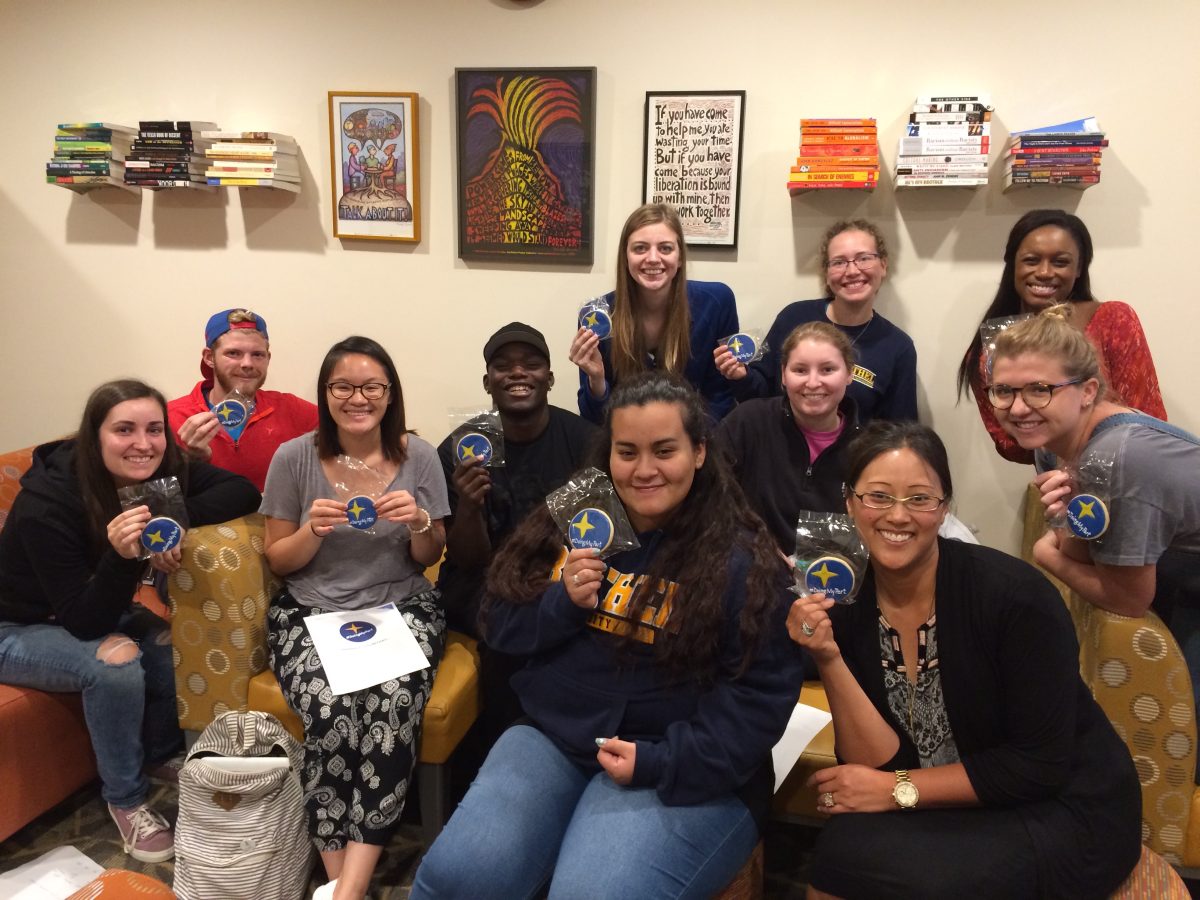A session in the Cultural Connection Center promotes a time of healing after a racial incident at the University of Northwestern.
CeCe Gaines | News Reporter
National Certified Global Career Development Facilitator Robyn Afrik led an interactive session to promote change and social action in students’ daily interactions with others Sept. 22. The event was held in the Cultural Connections Center (CCC).
Originally from Korea, Afrik was abandoned at birth. She was found and placed in a foster home for six months until she was adopted. When she went to college at Valparaiso University in Indiana she met her husband who is from Sierra Leone. They now have three children and live in Holland, Mich.
At the beginning of her college career, Afrik had an identity crisis when she had an encounter with the Ku Klux Klan on campus. Because of her upbringing in a white mono-cultural Dutch community, she did not know how to process the situation.
“There was nothing there to teach me what it means to be who I was meant to be versus who I was taught to be,” Afrik said.
Afrik wanted to allow students to start the year by making a statement on campus about what they stood for. She wanted create a safe space for others in the community to join and learn what other students stood for. Afrik affirmed that immersing herself in the intercultural department at her alma mater immensely helped her.
“One of the biggest saving graces for me in college was having a place like this (the CCC),” she said.
The session then became an open dialogue for students to share challenges they face at Bethel either individually or as a community in regards to identity and neighborhood.
“This is my last year.” said Kiersti Phenow, a senior reconciliation studies and social work major. “(It seems) complex, but… we’re still having these beginning conversations about identity formation. It’s like having to convince people why you should care about your neighbor.”
Taz Song’ony, a sophomore musical theatre and business major emphasized the toll of educating others on culture.
“It gets hard to have an open mind and to appreciate that we’re all learning and where everyone is in life. But where (is) the line of ‘I’m going to be respectful and ask good questions,’ (and) how am I not going to be your token black person to (answer) these questions?”
Another topic of discussion that sparked conversation were the incidents that happened at the University of Northwestern Sept. 20 and 21. Northwestern students painted “Black Lives Matter” on their rock, comparable to the rock in Bethel’s Kresge courtyard. The next morning, the message was painted over by administration because Northwestern allegedly prefers to stay neutral in political situations, according to Bethel sophomore nursing major, Michelle Gallegos. Later that day, some students repainted “Black Lives Matter” on the rock, and the names of some of the victims of police brutality. A few hours later, the rock was again painted over by another group of students who covered the “black” in “Black Lives Matter” with “all,” so it read “All Lives Matter.”
In response to these events many students reflected their pain.
“Being at Bethel, it’s kind of thinking through what would happen here if something like that were to happen. Or even, what we can do to support our sister school” Gallegos said.”I’m really close to some people over there so I feel their pain even though I’m at a different campus.”
After hearing some of the challenging dynamics students are facing at Bethel in regards to identity and neighborhood Afrik wanted to explore why students continue to stay here.
Phenow affirmed that conversations continue to happen at Bethel and have been occurring for the past 13 years. When major events such as the ones at Northwestern and Charlotte, North Carolina happen, the general response at Bethel is still apathy or silence. This, according to Phenow, makes the neighborhood at Bethel feel unsafe. However, she thinks that there is a deep community at Bethel, the ability to relate in spaces that, in the majority, you can’t always find.
The session ended with Afrik providing students with advice to strive toward change.
“When you look at both of [the police officer and the African-American who was shot]… you take off their outfits, take off their skin colors. Do they both equally deserve love?” Afrik said. “According to the identity of who we are in Christ…yes. They both deserve forgiveness for what they did or didn’t do.”

![Nelson Hall Resident Director Kendall Engelke Davis looks over to see what Resident Assistant Chloe Smith paints. For her weekly 8 p.m. staff development meeting in Nelson Shack April 16, Engelke Davis held a watercolor event to relieve stress. “It’s a unique opportunity to get to really invest and be in [RAs’] lives,” Engelke Davis said, “which I consider such a privilege.”](http://thebuclarion.com/wp-content/uploads/2024/05/041624_KendallEngelkeDavis_Holland_05-1200x800.jpg)
















![Nelson Hall Resident Director Kendall Engelke Davis looks over to see what Resident Assistant Chloe Smith paints. For her weekly 8 p.m. staff development meeting in Nelson Shack April 16, Engelke Davis held a watercolor event to relieve stress. “It’s a unique opportunity to get to really invest and be in [RAs’] lives,” Engelke Davis said, “which I consider such a privilege.”](https://thebuclarion.com/wp-content/uploads/2024/05/041624_KendallEngelkeDavis_Holland_05-1200x800.jpg)


